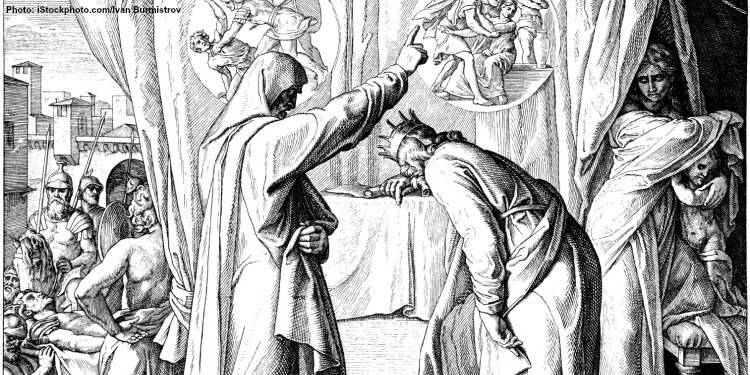Our Covered Sins
The Fellowship | September 26, 2019

Blessed is the one
whose transgressions are forgiven,
whose sins are covered.
Blessed is the one
whose sin the LORD does not count against them
and in whose spirit is no deceit. — Psalm 32:1-2
The Hebrew month of Elul, which means “search,” is a time of intense soul-searching and repentance in preparation for the High Holy Days of Rosh Hashanah and Yom Kippur. Elul is also a time to begin the process of asking for forgiveness for wrongs done to others. This is one of 13 devotions on repentance and forgiveness. To learn more about the shofar, which is blown every weekday during Elul¸ download our complimentary Bible study.
When Adam and Eve sinned, they covered themselves with fig leaves (Genesis 2:7), and when we sin, we often try to cover it up, too. Sometimes our natural instinct is to pretend it didn’t happen and hope no one noticed our sin. But we are foolish to think we can hide our sins from God.
In Psalm 32, David shares his experience of trying to hide his sin. He says that when he kept silent about his sin, it made him sick, at least figuratively. He felt God’s hand heavy upon him until he finally acknowledged his sin to God (Psalm 32:3–5). That’s why David said the one “in whose spirit is no deceit” is “blessed” (Psalm 32:2). A deceitful spirit tries to hide sin, but one in whom there is no deceit does not try to cover it up or hide it from God.
Confessing his sin was such a relief that David urged others to confess their sins immediately, rather than trying to hide them. The Hebrew translation of Psalm 32:6 reads, “Therefore let every faithful man pray to You upon discovering [his sin].”
David uses three Hebrew verbs in relation to forgiveness of sin (Psalm 32:1-2). The first is nesuy, which is translated “are forgiven” but it literally means “carried away.” This speaks of the removal of sin. The second is kesuy, meaning “are covered.” When sin is covered, God does not look upon the sin anymore. And the third is lo’yahshob, which is translated “does not count.” This verb expresses God’s attitude toward forgiven sin: He does not count it against you.
Hiding his sin made David miserable, but then he said, “I acknowledged my sin to you and did not cover up my iniquity . . . and you forgave the guilt of my sin” (Psalm 32:5). This is why David exclaimed: “Blessed is he . . . whose sins are covered” (Psalm 32:1). Once David stopped covering up his sin, it was covered by God.
Whenever we are tempted to cover up our sins, remember that if we confess them to God, He will carry our sins away, cover them up so He can’t see them anymore, and then, He will not count them against us. As God spoke through the prophet Isaiah, “I, even I, am he who blots out your transgressions, for my own sake, and remembers your sins no more” (Isaiah 43:25).
What a relief!
